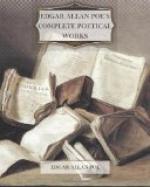“The teeming brain of childhood requires no external world of incident to occupy or amuse it. The morning’s awakening, the nightly summons to bed; the connings, the recitations, the periodical half-holidays and perambulations, the playground, with its broils, its pastimes, its intrigues—these, by a mental sorcery long forgotten, were made to involve a wilderness of sensation, a world of rich incident, a universe of varied emotion, of excitement the most passionate and spirit-stirring, ’Oh, le bon temps, que ce siecle de fer!’"
From this world of boyish imagination Poe was called to his adopted parents’ home in the United States. He returned to America in 1821, and was speedily placed in an academy in Richmond, Virginia, in which city the Allans continued to reside. Already well grounded in the elementary processes of education, not without reputation on account of his European residence, handsome, proud, and regarded as the heir of a wealthy man, Poe must have been looked up to with no little respect by his fellow pupils. He speedily made himself a prominent position in the school, not only by his classical attainments, but by his athletic feats—accomplishments calculated to render him a leader among lads.
“In the simple school athletics
of those days, when a gymnasium had
not been heard of, he was ’facile
princeps’,”
is the reminiscence of his fellow pupil, Colonel T. L. Preston. Poe he remembers as
“a swift runner, a wonderful leaper, and, what was more rare, a boxer, with some slight training.... He would allow the strongest boy in the school to strike him with full force in the chest. He taught me the secret, and I imitated him, after my measure. It was to inflate the lungs to the uttermost, and at the moment of receiving the blow to exhale the air. It looked surprising, and was, indeed, a little rough; but with a good breast-bone, and some resolution, it was not difficult to stand it. For swimming he was noted, being in many of his athletic proclivities surprisingly like Byron in his youth.”
In one of his feats Poe only came off second best.
“A challenge to a foot race,” says Colonel Preston, “had been passed between the two classical schools of the city; we selected Poe as our champion. The race came off one bright May morning at sunrise, in the Capitol Square. Historical truth compels me to add that on this occasion our school was beaten, and we had to pay up our small bets. Poe ran well, but his competitor was a long-legged, Indian-looking fellow, who would have outstripped Atalanta without the help of the golden apples.”
“In our Latin exercises in school,” continues the colonel, “Poe was among the first—not first without dispute. We had competitors who fairly disputed the palm, especially one, Nat Howard, afterwards known as one of the ripest scholars in Virginia, and distinguished also




